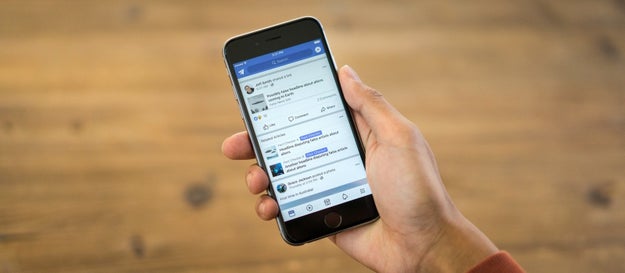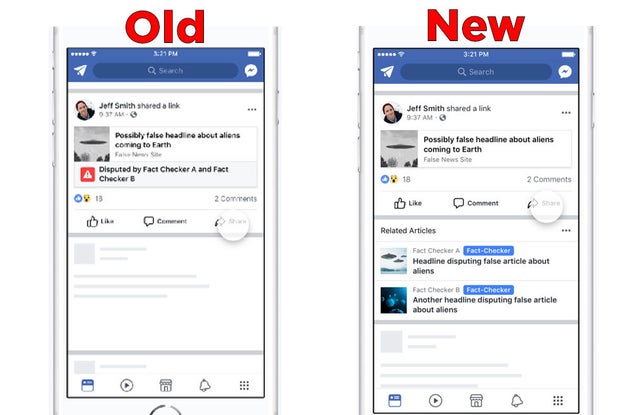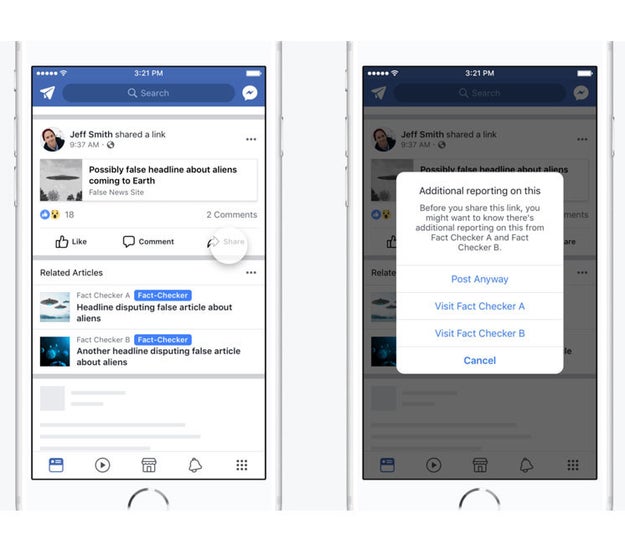
Facebook / Via medium.com
Facebook will stop flagging content that’s been declared false by external fact checkers, and will instead surface fact checks as related articles in the News Feed, the social media giant announced Wednesday.
The move represents the biggest outward facing change to Facebook’s year-old partnership with fact checkers. The company said this new approach will be more effective in stopping the spread of misinformation, while also making it easier to scale its effort to other markets and content types.
Tessa Lyons, a News Feed product manager, told BuzzFeed News that surfacing fact checks as related articles proved more effective in tests than applying a disputed flag to stories in the News Feed.
“Related articles outperformed disputed flags in giving people more information so they could understand what was true or false,” she said. “Hoaxes that had related article fact checks had fewer shares than those with the disputed flag.”
The related articles module appears underneath a piece of content in the News Feed, and was first rolled out in April.

BuzzFeed
Lyons wrote in a blog post announcing the change that “putting a strong image, like a red flag, next to an article may actually entrench deeply held beliefs — the opposite effect to what we intended. Related Articles, by contrast, are simply designed to give more context, which our research has shown is a more effective way to help people get to the facts.”
Brendan Nyhan, a political scientist at Dartmouth College who researches misinformation, said he was “optimistic” about the change.
“I have always been concerned that [disputed flags] were not being widely deployed and were not politically feasible to scale up,” he told BuzzFeed News. “Surfacing fact-checks in related articles seems less intrusive and thus is likely to be more palatable to users.”
Aside from the difference users will see in the News Feed, the change could make it easier for Facebook to surface different kinds of fact checks. The disputed flag was only applied to links deemed completely false by at least two fact checkers. Related articles will show fact checks with more nuanced ratings, such as “mostly true,” and will instantly surface a single fact check. Internal data from Facebook found that on average it took three days for the multi-party disputed label to be applied to a piece of content.
“The disputed flag was difficult to scale to other markets, to scale where there are not as many fact checkers,” Lyons said.
It also only worked with links shared on Facebook. The company recently indicated that in the coming year, it plans to tackle misinformation in the form of photos and videos on its platform Surfacing a fact check as a piece of related content to a meme is more feasible than applying a disputed flag, according to the company.

As part of the announcement, Facebook published a Medium post by three employees who over the last year “traveled around the world, from Germany to Indonesia, talking with people about their experiences with misinformation.” They cited four reasons why the disputed label was ineffective, including the fact that it took several clicks for users to get to the fact check. The post also noted that Facebook’s fact-checking partners will be highlighted with a special “badge” in the related articles module.
Since its launch was announced almost exactly a year ago, the disputed flag has been a source of scrutiny and criticism. Some reports suggested it could actually make people more inclined to share an article. A study by two Yale researchers also questioned whether the label had any effect of users’ perceptions of the accuracy of the flagged content.
With the new change, Facebook has confirmed this initial attempt wasn’t the best solution. Lyons told BuzzFeed News the related articles approach is an improvement, but one that will need to be tested and studied over time.
“The fight against misinformation is an ongoing one that’s going to take us doing our own research,” she said. “It’s an iterative process.”
from BuzzFeed - Tech https://www.buzzfeed.com/craigsilverman/facebook-is-getting-rid-of-its-fact-checking-label-and?utm_term=4ldqpia
No comments:
Post a Comment